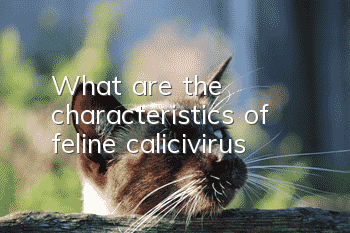What are the characteristics of feline calicivirus?

Characteristics of calicivirus:
1. Cats of any age may be infected with calicivirus. Cats susceptible to calicivirus are young cats.
2. Calicivirus is extremely contagious and can be spread among cats through saliva, eye secretions, nasal secretions, and excrement. Once infected, calicivirus is carried permanently and will continue to shed the virus and infect other cats regardless of whether symptoms occur.
Symptoms of calicivirus:
1. Cats infected with calicivirus will have symptoms such as frequent sneezing, fever, oral ulcers, and excessive salivation.
2. After a period of onset, symptoms such as anorexia, depression, conjunctivitis, keratitis, corneal ulcers, and pus accumulation in the eyes will occur, accompanied by various complications, such as bronchitis and tracheitis. , fatty liver, etc.
3. There are also different strains of calicivirus that can cause arthritis, interstitial pneumonia, turbinate ulcers, nasal congestion and other symptoms.
4. Symptoms such as jaundice, skin ulcers, pneumonia, and severe edema may also occur.
Methods to determine whether you are infected with the virus:
There are many causes of cat sneezing. If the cat sneezes for more than 48 hours and is accompanied by other symptoms, it is very possible. It's infected with calicivirus. Owners can use the reagents of the Feline Calicivirus Test Kit for nucleic acid testing. If the test result is positive, the cat can be diagnosed with calicivirus infection. If the diagnosis is confirmed, it is recommended to take the cat to a pet hospital for medical treatment as soon as possible, and use antiviral, digestive and other drugs for symptomatic and supportive treatment.
- Can cats drink Huoxiang Zhengqi water?
- Cats are adorable, do you know how to feed kittens scientifically?
- How to raise Burmese cats Burmese cat raising tips
- How to raise British Shorthair cats British Shorthair feeding tips
- Cat bleeds after giving birth
- Is rhinal branchia serious in cats?
- How many months does it take for a Ragdoll cat to open its face?
- What are the signs of pregnancy in Ragdoll cats?
- Are Ragdoll cats prone to getting sick? Common diseases and prevention of Ragdoll cats!
- What will happen if cats use human shower gel? Can American shorthair cats use human shower gel when bathing?



